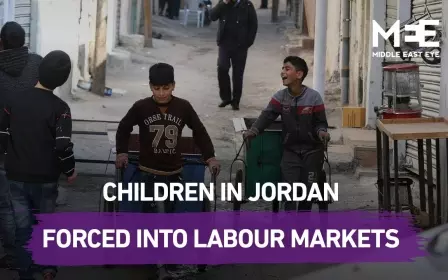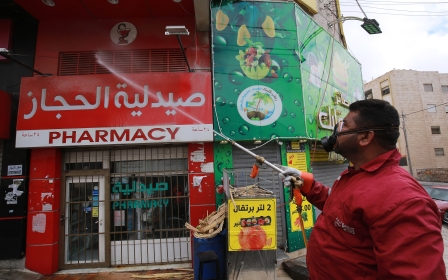Jordan: Tens of thousands at risk of prison over unpaid debt

A report published on Tuesday has raised concerns over the increasing number of Jordanians who end up in prison every year over failing to repay their loans.
The report by Human Rights Watch (HRW) documents harsh measures taken against people who are unable to pay off their debts in a country that is increasingly facing the repercussions of the Covid-19 pandemic and worsening economic conditions.
In Jordan, failure to repay debt can carry a penalty of up to 90 days in prison per debt, however serving the prison sentence does not resolve the debt.
According to government statistics, the number of people wanted for debt imprisonment rose tenfold in four years, reaching over 43,000 people in 2019.
The rights group has demanded that authorities urgently replace laws that allow people to be imprisoned for their debt, and provide them with support.
“Most countries have abolished imprisonment for debt, not only because it is extremely harsh and violates international human rights law, but because it does not lead to repayment, especially from the poor," the report states.
"Instead, debt imprisonment punishes those who cannot pay and helps create cycles of endless debt.”
Under Article 22 of the Jordan Execution Law, creditors can request that a borrower is imprisoned if they fail to repay their outstanding debt payments.
Many of the people interviewed by HRW said that they take out loans to pay for necessities, such as utilities, school fees, groceries and medical bills.
As the economy continues to deteriorate, many Jordanians have resorted to taking out loans and find themselves at risk of imprisonment, particularly as courts routinely sentence people without a hearing and the law does not make exceptions for lack of income.
Due to the absence of regulations and mechanisms to dispute the debt, many find themselves behind bars, further harming families as they are unable to secure everyday essentials.
Fleeing debt
Some have even been forced to sell off their possessions to be able to pay off rent installments.
“The last time I was arrested, I was in the hospital visiting my father because his health condition was really bad. They came to the hospital and arrested me there. Now my father has passed away...my family had to sell my car just to get me out of prison. After that, I left and came to Turkey,” one of the people interviewed by HRW said.
In another case documented by HRW, a Jordanian man who now resides in Egypt, said he was unable to find a job after falling into debt.
“I graduated from a good school with a degree in finance, but what bank would take me? What fault is it of mine? No way would I be employed over something like this. I was supposed to have a job and get married and start a family, and I cannot do anything,” he said.
'They came to the hospital and arrested me there. Now my father has passed away...my family had to sell my car just to get me out of prison'
- Jordanian man
As a result of the harsh measures against those in debt, many people have chosen to flee the country in order to avoid imprisonment and the stigma that surrounds it.
Human Rights Watch has called on judges in the country to explore alternatives by assessing the ability of debtors to pay and developing repayment schedules based on their financial situations.
“The law should clearly differentiate between those unable to repay their loans and those unwilling, and treat those committing fraud accordingly,” the rights group added.
Protests have broken out across Jordan this week as people voice their concerns about how the government has handled the coronavirus pandemic. The mounting anger comes after seven patients died in a hospital in the town of As-Salt on Saturday due to a lack of oxygen.
Jordan was already experiencing an unemployment spike prior to the pandemic, which has only worsened conditions.
Middle East Eye delivers independent and unrivalled coverage and analysis of the Middle East, North Africa and beyond. To learn more about republishing this content and the associated fees, please fill out this form. More about MEE can be found here.





